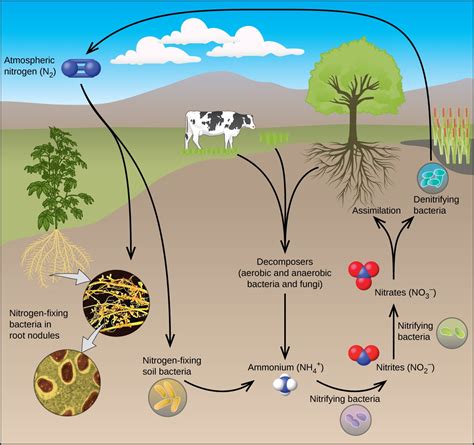Nitrogen is an essential element for life, and it is the most abundant element in the Earth’s atmosphere. However, most organisms cannot use atmospheric nitrogen directly. They must rely on nitrogen-fixing bacteria to convert atmospheric nitrogen into a form that they can use.

Nitrogen-fixing bacteria are found in the soil, and they can also live in association with plants. These bacteria have the ability to convert atmospheric nitrogen into ammonia, which is then converted into nitrate and nitrite. These forms of nitrogen can be used by plants and other organisms.
The process of nitrogen fixation is essential for life on Earth. Without nitrogen-fixing bacteria, plants would not be able to grow, and animals would not be able to survive.
How Do Nitrogen-Fixing Bacteria Work?
Nitrogen-fixing bacteria have a unique enzyme called nitrogenase, which allows them to convert atmospheric nitrogen into ammonia. Nitrogenase is a very complex enzyme, and it requires a lot of energy to function.
The process of nitrogen fixation is also very sensitive to oxygen. Oxygen can inactivate nitrogenase, so nitrogen-fixing bacteria must live in anaerobic conditions.
Where Are Nitrogen-Fixing Bacteria Found?
Nitrogen-fixing bacteria are found in a variety of habitats, including:
- The soil
- The roots of plants
- The digestive tracts of animals
- The oceans
The Importance of Nitrogen Fixation
Nitrogen fixation is essential for life on Earth. It is the only way that atmospheric nitrogen can be converted into a form that can be used by plants and other organisms.
Nitrogen fixation is a very important process, and it is essential for the survival of life on Earth.
How Can We Increase Nitrogen Fixation?
There are a number of ways that we can increase nitrogen fixation, including:
- Planting legumes: Legumes are plants that have a symbiotic relationship with nitrogen-fixing bacteria. These bacteria live in the roots of legumes, and they provide the plant with nitrogen in exchange for carbohydrates.
- Adding organic matter to the soil: Organic matter provides a source of carbon for nitrogen-fixing bacteria. This carbon helps the bacteria to grow and reproduce, which increases the rate of nitrogen fixation.
- Using nitrogen-fixing fertilizers: Nitrogen-fixing fertilizers contain bacteria that can convert atmospheric nitrogen into a form that can be used by plants. These fertilizers can be used to increase the yield of crops.
The Future of Nitrogen Fixation
Nitrogen fixation is a very important process, and it is essential for the survival of life on Earth. As the world’s population continues to grow, we will need to find ways to increase nitrogen fixation in order to meet the growing demand for food.
Conclusion
Nitrogen fixation is a complex and essential process for life on Earth. It is the only way that atmospheric nitrogen can be converted into a form that can be used by plants and other organisms. Nitrogen fixation is a very important process, and it is essential for the survival of life on Earth.
FAQs
What is nitrogen fixation?
Nitrogen fixation is the process of converting atmospheric nitrogen into a form that can be used by plants and other organisms.
How do nitrogen-fixing bacteria work?
Nitrogen-fixing bacteria have a unique enzyme called nitrogenase, which allows them to convert atmospheric nitrogen into ammonia.
Where are nitrogen-fixing bacteria found?
Nitrogen-fixing bacteria are found in a variety of habitats, including the soil, the roots of plants, the digestive tracts of animals, and the oceans.
Why is nitrogen fixation important?
Nitrogen fixation is essential for life on Earth. It is the only way that atmospheric nitrogen can be converted into a form that can be used by plants and other organisms.
How can we increase nitrogen fixation?
There are a number of ways that we can increase nitrogen fixation, including planting legumes, adding organic matter to the soil, and using nitrogen-fixing fertilizers.
Keyword-Rich Summary
- Nitrogen fixation is the process of converting atmospheric nitrogen into a form that can be used by plants and other organisms.
- Nitrogen-fixing bacteria have a unique enzyme called nitrogenase, which allows them to convert atmospheric nitrogen into ammonia.
- Nitrogen-fixing bacteria are found in a variety of habitats, including the soil, the roots of plants, the digestive tracts of animals, and the oceans.
- Nitrogen fixation is essential for life on Earth. It is the only way that atmospheric nitrogen can be converted into a form that can be used by plants and other organisms.
- There are a number of ways that we can increase nitrogen fixation, including planting legumes, adding organic matter to the soil, and using nitrogen-fixing fertilizers.
